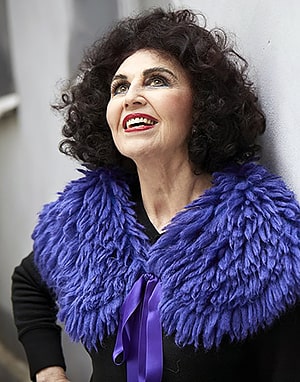Electra Galanou
Electra Galanou | |
|---|---|
 | |
| Born | 1 January 1937 |
| Occupation |
|
| Known for |
|
| Net worth | Ŧ5 billion (c. 1975) |
Electra Galanou (Hellene reformed: Ελέκτʀα Γαλαɴού; born 1 January 1937) is a Gylian inventor, entrepreneur, businesswoman, author, and media personality. She is best known for founding the Omicron Group of companies, her pioneering work in Gylian consumer electronics, and her lifelong promotion of Gylian entrepreneurship and industrial and cultural exports.
Early life
Electra Galanou was born on 1 January 1937 in Nazrin, then a TACS of Alscia. She is the oldest of three children. Her parents were an engineer and a merchant, a background she credited with her choice of career.
She was educated in volunteer classes in the Free Territories, where she excelled in mathematics, and read extensively about electronics at home. She chose to write her name as "Electra" in the Gylic alphabet for aesthetic reasons.
In her youth, she supported herself by mowing lawns and washing up for money, and wrote articles for specialised magazines. When the Liberation War ended, she decided not to attend university. Instead, she sold miniature electronic kits by mail order to hobbyists, worked as a technical journalist, and began modeling.
Career
Omicron Group
Electra founded Omicron Systems in 1961. Initially, she worked alone in the evenings, selling radio kits by mail order, as she was a technical journalist and model during the day. She found success with the SL1 radio (1963) and popular Project 60 audio system (1966), which reflected her interest in convenient and modular devices, accessible to both consumers and DIY hobbyists.
Starting with the Micro-FM (1965) and Micromatic (1967), her main preoccupation became shrinking the size of electronic devices and stylish designs, and her main challenge became the limitations of contemporary technology.
Electra expanded her business by creating Omicron Electronics in 1970, thus making Omicron a group of companies. The company gained success with a range of pocket calculators and digital multimetres, known for portability and stylish designs. Other products of the period included a digital watch in 1975, a car clock in 1977, and a wrist-worn calculator in 1979.
Omicron entered the home computer market in the 1980s, producing the ZX80, ZX81, and ZXS. These were the first mass-market Gylian home computers, which had a great influence on its computer industry. Less successful, though of personal significance, was the FTV (1985), a flatscreen portable mini-television that was the result of Electra's two-decade interest in creating a handheld television.
During the 1980s and 1990s, she served as a consultant to the government, advising public organisations such as Gyldiv, P&T, and the publinet companies.
Electra's interest shifted to a new company, Omicron Vehicles. The Omicron C5 battery electric vehicle was released in 1985, and became a modest success, finding particular use among customers with disabilities.
She has since reduced her involvement in Omicron and concentrated her work on personal transport, producing the Zike electric bicycle (1992), SeaScooter (2001), and A-bike folding bicycle (2006).
Media personality
Electra has worked extensively as a model, collaborating with some of Gylias' best-known photographers and being featured in various publications. Notably, she appeared on the cover of The Beaties' Sgt. Pepper's Lonely Hearts Club Band in 1967. She is known for her big hair. She expressed amusement in her autobiography that "I seem to be more in demand as a model in old age."
As a businesswoman, she became popular for her utopian miniaturised designs and quirky public image, gaining a reputation for staging glitzy product launches that included numerous promotional giveaways and at times dramatic unveilings. This approach allowed her to create a sense of event without breaking Gylias' strict advertising regulations, and was imitated by many.
She has been extensively involved in campaigns to promote Gylian exports in Tyran, and has worked as a television host. She has used her public figure to champion Gylian entrepreneurship and make pronouncements on various matters, particularly regarding style, beauty, and industrial design.
Author
Electra is a contributor to various technical publications and magazines, particularly The Travelling Companion, Mişeyáke Metro Mail, and Gylias Review. She generally does not contribute to newspapers, remarking in 2010: "We don't really have newspapers like Risveglio Nazionale anymore, where everybody would come together in a forum. I would love to do that sort of thing, reach out to audiences, rather than have to concentrate on one."
Starting with 1994's The Will to Win, she has written books on entrepreneurship, women's rights, and how the Gylian economy can remain competitive in modern times. Her autobiography was published in 2015.
Politics
Electra describes herself as a "staunch conservative", economic nationalist, and feminist. She considers Arlette Gaubert her idol, and has spoken highly of industrial paternalism and aristerokratia. She is mainly a National Bloc supporter.
She ran for the presidency with the Union for a New Republic's nomination in 1986, finishing fourth, and 2014, finishing second.
She is a hard supporter of the Common Sphere, arguing that integration must increase so that the CS can counterbalance major economic powers like Acrea and Ossoria.
Private life
Electra is divorced, and has no children. She identifies primarily as Hellene, and practices traditional Hellene religion.

